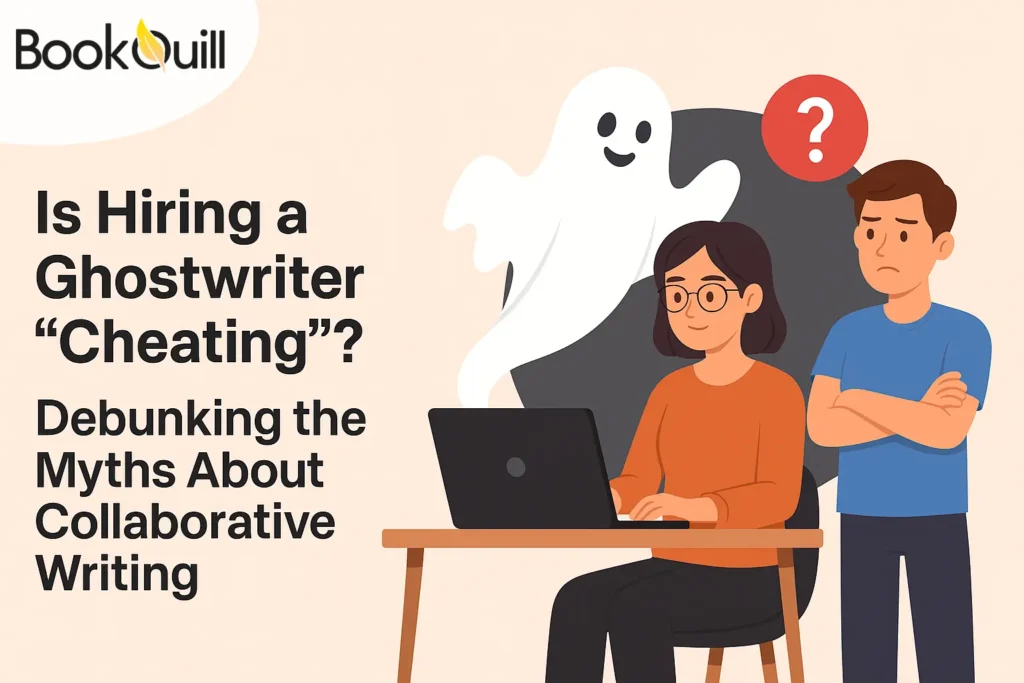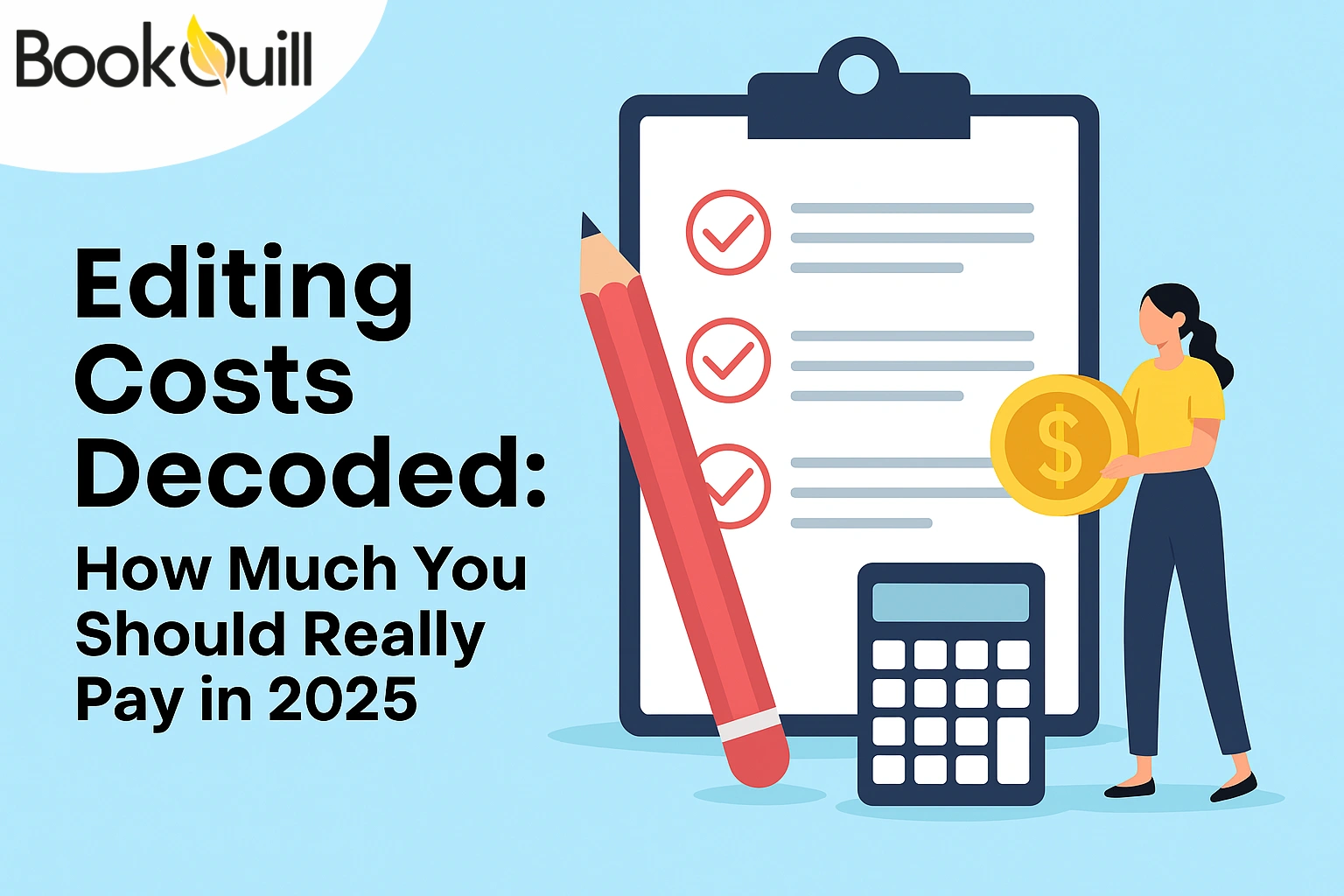Table of Contents
Explore Blogs
Trending on Ebook
Is Hiring a Ghostwriter “Cheating”? Debunking the Myths About Collaborative Writing

You’ve probably heard it before: “If you didn’t write every word yourself, you’re not a real author.” That’s the kind of comment that keeps people quiet about using ghostwriters. But here’s the thing: is that really true? Or is it just another outdated opinion?
We live in a world where collaboration is normal. CEOs don’t design their logos. Public speakers don’t build their own slides. Yet somehow, writing still feels… personal. Almost too personal to ask for help.
If you’ve ever thought about telling your story, publishing a book, or creating something meaningful, but got stuck on the “who actually writes it” part, this blog is for you.
We’re going to talk about hiring a Ghostwriter and everything people don’t usually tell you. Myths, facts, ethics, ownership, value, it’s all here. No fluff. Just real talk, backed with examples, and a look behind the scenes at what ghostwriting actually is (and isn’t).
So, let’s get started.
Key Takeaways
- What it is: Ghostwriting is when a professional writes content (like a book or blog) for someone else, but the credited author is still you. You provide the ideas, and the ghostwriter shapes them into polished writing—often staying anonymous.
- Common Myths: Many believe ghostwriting is dishonest, only for celebrities, or means giving up control—but these are false. It’s a professional, ethical service used by everyday experts, and the author stays in charge.
- Your Rights: You keep full ownership of the content. You direct the vision, approve the writing, and decide if the ghostwriter is named or stays invisible. Most contracts give you all rights and royalties.
- How it Helps: Hiring a ghostwriter saves you time, improves quality, and helps turn your ideas into clear, engaging content. They bring writing skill, structure, and polish—while you stay the voice and decision-maker.
What is Meant by Ghostwriting?
Let’s start by defining ghostwriting in simple terms. It is when someone writes content for you—like a book, blog, article, or speech—but your name goes on it. You’re still the author in terms of ownership and direction, but the writing work itself is handled by someone else behind the scenes. That person is the ghostwriter. This person stays invisible in public credit. According to Wikipedia’s entry on ghostwriters, the writer “writes for the credited author” and often signs confidentiality agreements.
However, the idea isn’t new. In fact, it’s pretty common. Politicians often hire ghostwriters to craft their speeches. Business leaders use them to write books. Celebrities do too—but so do regular people with great ideas and no time to write them out.
Now, you might hear terms like ghost authorship or ghost credit thrown around. Here’s what those mean:
- Ghost authorship is the invisible work—the interviews, writing, editing, and shaping your voice.
- Ghost credit refers to how (or if) the ghostwriter is mentioned. Sometimes they’re totally invisible. Other times, you’ll see things like “with [Writer’s Name]” or “as told to…”
Ghostwriting appears in multiple fields:
- Books (nonfiction, memoirs)
- Blog posts and articles
- Speeches or executive letters
- Marketing content and thought leadership
Some authors come to ghostwriters with outlines or rough drafts. Others hand over ideas, dictations, or voice memos. The ghostwriter’s job is to shape those ideas into clean, readable content that matches your voice.
Does it Really Help?
Reports suggest Michelle Obama received ghostwriting and editorial support for her bestselling memoir Becoming. While not officially confirmed, her acknowledgments section thanks a team of people who helped shape the final book. Even celebrities like Nicole Ritchie, Pamela Anderson, and Gwyneth Paltrow have admitted to using ghostwriters for their published works. Politicians, CEOs, doctors, influencers, they’ve all done it. Why? Having a great story or message doesn’t always mean you have the time, skill, or energy to write it alone. Basically, hiring a ghostwriter is more about collaboration. And it’s more common than you think.
But here’s where things often get a little messy, because ghostwriting still carries a lot of misunderstanding. Some people call it cheating. Others assume it’s only for celebrities or think it means giving up creative control. So, let’s clear the air.
Common Ghostwriting Myths (And the Truth Behind Them)
These are the common fears people bring up, and we’ll unpack them side by side.
Myth 1: Ghostwriting is dishonest
Truth: It’s a paid, transparent service, like hiring an editor, designer, or publicist. You still own the ideas. The ghostwriter simply helps with expression.
Myth 2: You can’t claim authorship
Truth: If the vision, topics, and decisions are yours, you absolutely can claim credit. Ghost credit is flexible. You and the writer can agree beforehand whether they remain invisible, get “with,” or “as told to” credit.
Myth 3: Only celebrities use ghostwriters
Truth: Many non-famous people use them: business owners, coaches, academics, and entrepreneurs. It’s a tool for getting things done when time or writing skills are limited.
Myth 4: It’s all just copying or AI
Truth: Real ghostwriting is tailored and voice-matched. It’s not plug-and-play. Also, many reputable ghostwriters avoid overuse of AI in content creation as a matter of quality and ethics (a trend noted by the Association of Ghostwriters in their 2025 predictions).
Myth 5: It’s only for people who “can’t write”
Truth: Many clients can write. They just don’t have bandwidth, consistency, or editorial distance. Ghostwriting is more about refining than replacing your own effort.
So, Hiring Professional Ghostwriting Services isn’t Cheating?
Now that we have cleared myths, let’s talk about why hiring a ghostwriter is not cheating at all.
Think of it as collaboration. You’re the thinker, the strategist, the visionary. The ghostwriter is your hands (and keyboard). You guide, you approve, you steer. You don’t disappear.
Even in movies, directors don’t always write scripts. In business, you often hire designers, photographers, or editors. Why should writing be any different?
Ghostwriters help:
- Refine language
- Structure ideas
- Polish tone
They often bring research skills, storytelling strength, and writing craft. You hold control of direction, message, and final approval. Also, ghost credit agreements clarify who gets named and how.
In some projects, the ghostwriter remains entirely invisible. In others, they get “with” or “as told to” mention. The process remains clean and transparent.
In short, it’s not cheating at all. However, it is a tool that gives your ideas shape and voice. It’s not shortcuts or cheating, but smart help.
The Ethics Behind Ghostwriting
Now let’s address the sticky parts: ethics. When is this legit, and when does it cross a line?
When ghostwriting is ethical
- You own the ideas.
- You’ve agreed on credit and disclosure upfront.
- The work isn’t used to misrepresent credentials (e.g., claiming scientific expertise you don’t have).
- It’s not done for academic dishonesty or fraud.
When it can be unethical
- If someone uses a ghostwriter to write a student’s exam, thesis, or assignment (that’s academic dishonesty).
- If the writing misleads the audience about credentials, capabilities, or data.
- If the ghostwriter hides fraud or plagiarism.
In the medical world, ghostwriting has been particularly controversial—pharma companies have sometimes commissioned articles and then strapped on academic names, without transparency.
But in publishing, business, speaking, and content marketing, ghostwriting is widely accepted as long as it’s done with clear agreements and disclosures.
Scribe Media, for example, emphasizes a structured, ethical writing and workflow. Their team writes, edits, and helps publish books while maintaining the author’s voice and giving them full ownership, too.
Who Actually Hires Ghostwriters?
Let’s paint a clearer portrait of people who work with ghostwriters.
- Authors who have ideas but limited writing time.
- Coaches, consultants, and speakers who want to turn workshops or keynotes into books.
- Business executives who want to position thought leadership.
- Professionals with niche expertise (e.g., in medicine, finance) who don’t enjoy writing.
- People with life stories or experiences who want to document them but don’t know how to structure or write a book.
You might expect only celebrities to use ghostwriters, but many prominent authors and thought leaders also opt for this approach.
This is where top ghostwriting services come in. Agencies and firms specialize in matching you with writers in your domain. For nonfiction, many of the top firms are focused on business, leadership, or self-help genres.
Because of this demand, the ghostwriting services market is growing rapidly. In 2024, it was valued at over USD 1.3 billion, and it’s projected to reach USD 2.23 billion by 2030 (CAGR ~7.8%). Some reports estimate even faster growth, with the market expanding to USD 7.5 billion by 2033.
People hire ghostwriters now not because they can’t write, but because they want to do better work, faster.
What the Ghostwriting Process Looks Like
Here’s a step-by-step view of how many ghostwriting projects run. Your exact flow may vary, but this gives you a realistic picture.
1. Discovery and Planning
You talk with the ghostwriter or agency, share ideas, goals, and audience. They may send a questionnaire or conduct interviews.
2. Outline and Structure
The ghostwriter drafts a chapter-by-chapter outline or roadmap. You review and suggest changes.
3. Research and Interviews
They may research, interview you or relevant sources, gather data, or ask for reference materials.
4. Drafting
The ghostwriter writes a first draft in your voice. You read, give feedback, and ask for changes.
5. Revisions and Edits
Several rounds ensue. You shape the tone, voice, and content.
6. Finalization
Once you’re happy, the work is polished, formatted, and handed off (or guided toward publishing).
You stay actively involved. Ghostwriters don’t just “take over”—they partner and adjust until it feels like your story.
Even expert firms like Scribe Media approach projects this way—they offer end-to-end support from writing through publishing.
Let’s Talk About Cost and Value
Here’s where many hesitate: cost. But it helps to understand what you’re actually paying for, and how the price varies.
What you’re paying for
- Time and writing hours
- Research, interviewing, fact-checking
- Voice-matching, editing, revisions
- Project management and communication
- Publishing or formatting help (in full-service companies)
- Price ranges and factors
According to SelfPublishing.com, ghostwriting a nonfiction book (~50,000 to 100,000 words) can range from $5,000 to $100,000+ depending on experience, service levels, and complexity. Some firms charge per word ($0.50 to $3.00+), others charge a flat project fee or a percentage of royalties.
A key factor: those premium firms offer more than writing; they offer:
- Strategy
- Editing
- Publishing guidance
That’s where professional ghost writing companies differ from lone freelancers. A smaller freelancer might be cheaper but offer fewer bells and whistles.
If you’re on a budget, an affordable ghostwriting agency might be a good middle ground. Be cautious: ultra-low prices may mean lower quality, less involvement, or hidden costs.
Does It Still Count as Your Book?
This is a big emotional concern. Let’s clear that: yes, it absolutely can be your book.
- You own the ideas.
- You direct tone, voice, and structure.
- You guide decisions.
The ghostwriter is invisible, not invasive.
In many cases, authors retain all rights and royalties. The writer signs a contract that gives you full ownership.
Sometimes, the ghostwriter is credited with “as told to” or “with” if that’s important to transparency. But that doesn’t reduce your authorship—it just adds clarity.
If you did train, revise heavily, or shape the book heavily, co-author credit might make sense. But that’s optional, not mandatory.
The bottom line: your name on the cover still matters. Your message, arguments, values, and perspective are still yours—even if a ghostwriter helped craft the words.
You get full credit for the vision. The ghostwriter is your tool, not the star.
How to Find the Right Ghostwriter
Here’s how you choose well and avoid regrets.
What to look for
- Portfolio or samples in your field/genre
- Clear communication style
- References or testimonials
- Contract with rights, credit, and confidentiality spelled out
Questions to ask
- How do you approach voice matching?
- What’s your revision policy?
- Do you use AI or drafts from others?
- Who retains rights? How will credit work?
- What’s your timeline and fees?
Some of the best ghost writing companies often do matchmaking. They ensure matches with authors and carefully vetted writers. You’ll want to see their past works, ask for client references, and ensure transparency.
When you feel they “get” your voice and mission, that’s a strong sign of a good fit.
Conclusion
So, here’s the bottom line: Hiring a Ghostwriter is not cheating. It’s a professional partnership that allows your ideas, stories, and expertise to be communicated in the clearest way possible. You’re still the author. The message, the experiences, and the ownership remain with you. The ghostwriter simply provides the craft and structure to make your words shine.
Many respected leaders, entrepreneurs, and creatives have gone this route, quietly but confidently. If anything, it shows wisdom. Why struggle through endless drafts when you can work with someone who does this every day?
The truth is, readers care about connection, not process. If your book, blog, or speech touches people, they won’t stop to ask if you helped write it. They’ll remember what it meant to them.
So don’t let the myths hold you back. If you’ve got a story worth sharing, consider ghostwriting as a tool. The important part isn’t who typed it—it’s that your voice is finally out in the world.
Frequently Asked Questions
Can ghostwriting be used for short content like blog posts or newsletters?
Yes, ghostwriting isn’t limited to books. Many writers ghostwrite blog posts, email campaigns, and newsletters. This helps individuals or businesses stay consistent without overloading themselves.
What should I demand in a ghostwriting contract?
Always include: rights and ownership (you retain full rights), credit terms, confidentiality, revision process, payment schedule, timeline, and contingencies (e.g., dropouts or disputes).
How do revision rounds usually work?
Most ghostwriters plan for 2–3 rounds of major revisions plus final polishing. Some include minor tweaks after publication. Good communication is key, so you don’t feel locked out.
How do I protect against plagiarism or low quality?
When hiring a ghostwriter, ask them to submit drafts to plagiarism checkers. Request writing samples and choose writers who have published completed books or case studies.
Will readers treat my ghostwritten book differently?
Probably not. Most readers don’t check credits deeply. What they see is the message, clarity, and authenticity. A well-executed ghostwritten book can achieve the same respect as one you wrote yourself.
Note: Some links in this post are affiliate links. If you buy through them, we may earn a small commission, at no extra cost to you. We only suggest tools we trust and find useful. Thanks for your support!
About Author
Hi My name is Micheal Adams, When I am not watching horror movies and helping my kids with homework or reading my favorite fantasy/supernatural novels – I’m writing to guide aspiring authors. I focus on exploring and simplifying both the technical aspects and the often-overlooked details of book writing and publishing so I can empower new writers to climb the Amazon bestseller list and connect with more readers.




